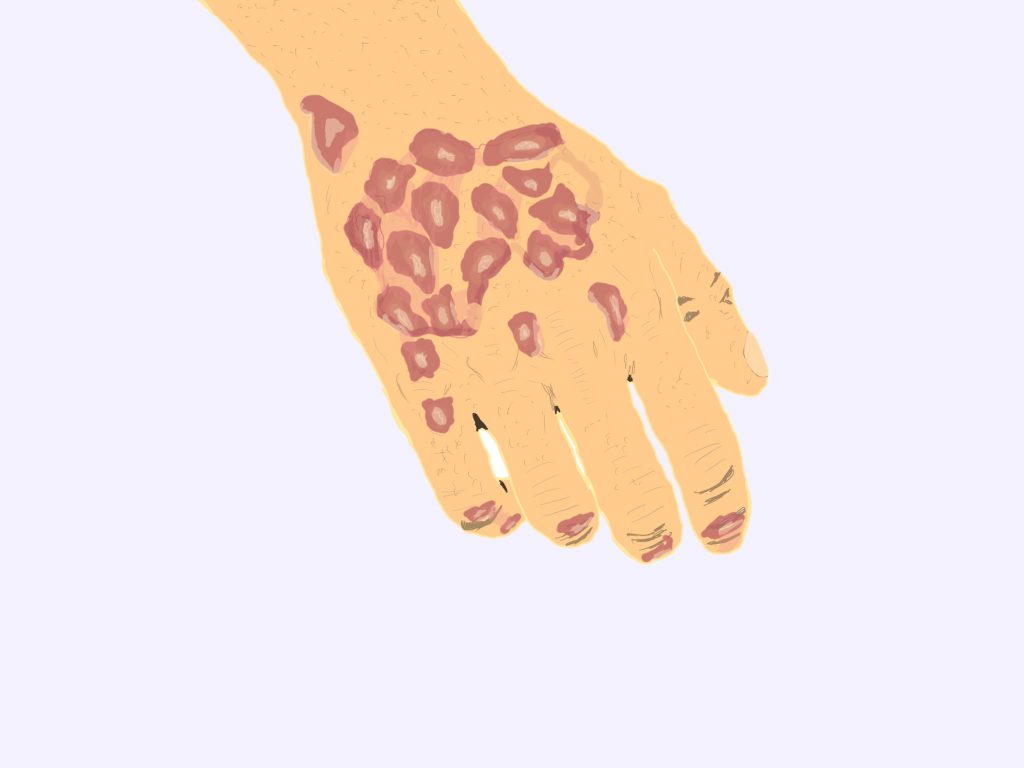Improvement of psoriasis-related arthritis by molecular hydrogen treatmentScientific Research

Improvement of psoriasis-associated arthritis and skin lesions by treatment with molecular hydrogen: A report of three cases
Abstract
Psoriasis is a chronic inflammatory skin disease caused by infiltrating lymphocytes and related cytokines, including tumor necrosis factor (TNF)α, interleukin (IL)-6, and IL-17. Effective treatments, including pathogenesis-based biologics for psoriasis, are under development. Although the role of reactive oxygen species (ROS) in the pathogenesis of psoriasis has been investigated, it remains to be fully elucidated; therapeutic strategies targeting ROS are currently lacking. Therefore, the aim of this study was to evaluate whether H2, a ROS scavenger, has a therapeutic effect on psoriasis-related inflammation by reducing hydroxyl radicals or peroxynitrite in the psoriasis immunogenic cascade. Three methods are used to manage H2: instillation of saline containing 1 ppm H2 (H2 saline), inhalation of 3% H2 gas, and drinking water with a high concentration (5-7 ppm) of H2 (high H2 water).
Treatment effect was estimated using the Disease Activity Score 28 (DAS28) system based on C-reactive protein levels and Psoriasis Area and Severity Index (PASI) scores determined at baseline and after each H2 treatment. In addition, the levels of TNFα, IL-6 and IL-17 were also analyzed. DAS28 and PASI scores decreased during H2 treatment in all three patients, regardless of administration method. The psoriatic lesions had almost completely disappeared at the end of treatment. IL-6 levels decreased during H2 treatment in cases 1 and 2. The higher concentration of IL-17 in case 1 was decreased after H2 treatment, as was TNFα in case 1. In conclusion, in the three cases studied, H2 administration reduced inflammation associated with psoriasis and can therefore be considered as a therapeutic strategy for psoriasis-related skin lesions and arthritis.
Cited by
- Nano-bubble hydrogen water: An effective therapeutic agent against inflammation related disease caused by viral infection in zebrafish model.Virol Sin. 2022 Apr;37(2):277-283. doi: 10.1016/j.virs.2022.01.023. Epub 2022 Jan 22.PMID: 35249853 Free PMC article.
- Protective effects of dissolved molecular hydrogen against hydrogen peroxide-, hydroperoxide-, and glyoxal-induced injuries to human skin keratinocytes.Mol Cell Biochem. 2021 Oct;476(10):3613-3622. doi: 10.1007/s11010-021-04189-z. Epub 2021 May 24.PMID: 34028646
- Hydrogen: A Novel Option in Human Disease Treatment.Oxid Med Cell Longev. 2020 Sep 5;2020:8384742. doi: 10.1155/2020/8384742. eCollection 2020.PMID: 32963703 Free PMC article. Review.
- Importance of Redox Equilibrium in the Pathogenesis of Psoriasis-Impact of Antioxidant-Rich Diet.Nutrients. 2020 Jun 20;12(6):1841. doi: 10.3390/nu12061841.PMID: 32575706 Free PMC article. Review.
- Positive effects of hydrogen-water bathing in patients of psoriasis and parapsoriasis en plaques.Sci Rep. 2018 May 23;8(1):8051. doi: 10.1038/s41598-018-26388-3.PMID: 29795283 Free PMC article.
DOI: 10.3892
Published on: 30/04/2015
Improvement of psoriasis-associated arthritis and skin lesions by treatment with molecular hydrogen: A report of three cases
AffiliationsAbstract
Psoriasis is a chronic inflammatory skin disease caused by infiltrating lymphocytes and related cytokines, including tumor necrosis factor (TNF)α, interleukin (IL)-6, and IL-17. Effective treatments, including pathogenesis-based biologics for psoriasis, are under development. Although the role of reactive oxygen species (ROS) in the pathogenesis of psoriasis has been investigated, it remains to be fully elucidated; therapeutic strategies targeting ROS are currently lacking. Therefore, the aim of this study was to evaluate whether H2, a ROS scavenger, has a therapeutic effect on psoriasis-related inflammation by reducing hydroxyl radicals or peroxynitrite in the psoriasis immunogenic cascade. Three methods are used to manage H2: instillation of saline containing 1 ppm H2 (H2 saline), inhalation of 3% H2 gas, and drinking water with a high concentration (5-7 ppm) of H2 (high H2 water).
Treatment effect was estimated using the Disease Activity Score 28 (DAS28) system based on C-reactive protein levels and Psoriasis Area and Severity Index (PASI) scores determined at baseline and after each H2 treatment. In addition, the levels of TNFα, IL-6 and IL-17 were also analyzed. DAS28 and PASI scores decreased during H2 treatment in all three patients, regardless of administration method. The psoriatic lesions had almost completely disappeared at the end of treatment. IL-6 levels decreased during H2 treatment in cases 1 and 2. The higher concentration of IL-17 in case 1 was decreased after H2 treatment, as was TNFα in case 1. In conclusion, in the three cases studied, H2 administration reduced inflammation associated with psoriasis and can therefore be considered as a therapeutic strategy for psoriasis-related skin lesions and arthritis.
Cited by



